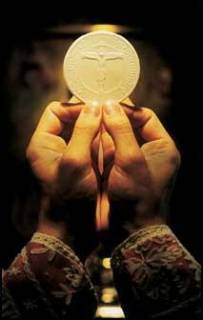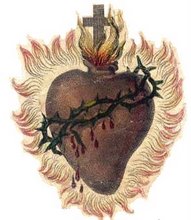Faithfulness in Small Things...
There has been a lot of discussion about the upcoming new translation of the Roman Missal (the texts used by priests to offer the Holy Mass). The translation we use now, hastily constructed after Vatican II, has been shown by Latinists, and declared by the Church, to be a translation that is wanting. The evidence of this? Very simply, the fact that there is a substantial new translation being promulgated! One can argue that this is not the right time, one can argue that the translation is sufficient. I would argue that the translation of the Holy Mass, the source and summit of our faith, must not simply be sufficient, and that if we do find it simply sufficient, we must move immediately to bring it to excellence.
We have become minimalistic in so many ways. Our dress, our entertainment, our music, our films, our literature...the list goes on and on. We are content with simply, trite, casual distractions and tasks, and as a culture have grown complacent with ordinariness. The Holy Mass must never be viewed as ordinary, but as extraordinary, as it is the pluperfect expression of our faith, the highest and most perfect form of divine worship, and the closest man can get this side of death to Heaven. We must never be satisfied with sufficiency, but strive for excellence, we must never be content with what is ordinary, but always reach for the extraordinary. Why? King David tells us in the 8th psalm: When I consider thy heavens, the work of thy fingers, the moon and
the stars, which thou hast ordained; What is man, that thou art mindful of him? and the son of man, that thou visitest him? For thou hast made him but little lower than God, and crownest him with glory and honour. Thou madest him to have dominion over the works of thy hands; thou hast put all things under his feet...
There have been some priests who have been trying to delay these new translations, and some who have openly called for dissent and disobedience when they are promulgated. I offer to all those who would contemplate that route this passage from Pope John Paul II's letter to the Church, Dominicae Cenae. The Holy Mass is entrusted to the Church by the Lord for the salvation of the world. Entrusted to the Church. Not to the individual, be he bishop, priest, or laymen to do with what he will. It is a gift that is given to us, and it is for us to reverently love and offer as the Giver of the gift intends.
God love you!
Father V.
************

Every priest who offers the holy Sacrifice should recall that during this Sacrifice it is not only he with his community that is praying but the whole Church, which is thus expressing in this sacrament her spiritual unity, among other ways by the use of the approved liturgical text. To call this position "mere insistence on uniformity" would only show ignorance of the objective requirements of authentic unity, and would be a symptom of harmful individualism.This subordination of the minister, of the celebrant, to the mysterium which has been entrusted to him by the Church for the good of the whole People of God, should also find expression in the observance of the liturgical requirements concerning the celebration of the holy Sacrifice. These refer, for example, to dress, in particular to the vestments worn by the celebrant. Circumstances have of course existed and continue to exist in which the prescriptions do not oblige. We have been greatly moved when reading books written by priests who had been prisoners in extermination camps, with descriptions of Eucharistic Celebrations without the above- mentioned rules, that is to say, without an altar and without vestments. But although in those conditions this was a proof of heroism and deserved profound admiration, nevertheless in normal conditions to ignore the liturgical directives can be interpreted as a lack of respect towards the Eucharist, dictated perhaps by individualism or by an absence of a critical sense concerning current opinions, or by a certain lack of a spirit of faith.
Upon all of us who, through the grace of God, are ministers of the Eucharist, there weighs a particular responsibility for the ideas and attitudes of our brothers and sisters who have been entrusted to our pastoral care. It is our vocation to nurture, above all by personal example, every healthy manifestation of worship towards Christ present and operative in that sacrament of love. May God preserve us from acting otherwise and weakening that worship by "becoming unaccustomed" to various manifestations and forms of eucharistic worship which express a perhaps "traditional" but healthy piety, and which express above all that "sense of the faith" possessed by the whole People of God, as the Second Vatican Council recalled.(70)As I bring these considerations to an end, I would like to ask forgiveness-in my own name and in the name of all of you, venerable and dear brothers in the episcopate-for everything which, for whatever reason, through whatever human weakness, impatience or negligence, and also through the at times partial, one-sided and erroneous application of the directives of the Second Vatican Council, may have caused scandal and disturbance concerning the interpretation of the doctrine and the veneration due to this great sacrament. And I pray the Lord Jesus that in the future we may avoid in our manner of dealing with this sacred mystery anything which could weaken or disorient in any way the sense of reverence and love that exists in our faithful people.


3 comments:
What a great resource!
This was an excellent look at the new Missal. I am relatively new to the Church (about one year), and I have been hearing more and more about the new Missal. I love the perspective that you have on the matter. Great reading.
In as much humility as this proud soul can muster, I bow in obedience to the Church on this matter. Trust in God. Trust in Jesus. If we but ask, they will send us each the Holy Spirit so that we can become better pray-ers of the Holy Mass. While the words of the Mass are important -- very important -- let's not get so focused on our own preferences in this regard that we forget the reasons we go to Mass: to worship God with our brothers and sisters and to receive Christ in the Eucharist.
Post a Comment